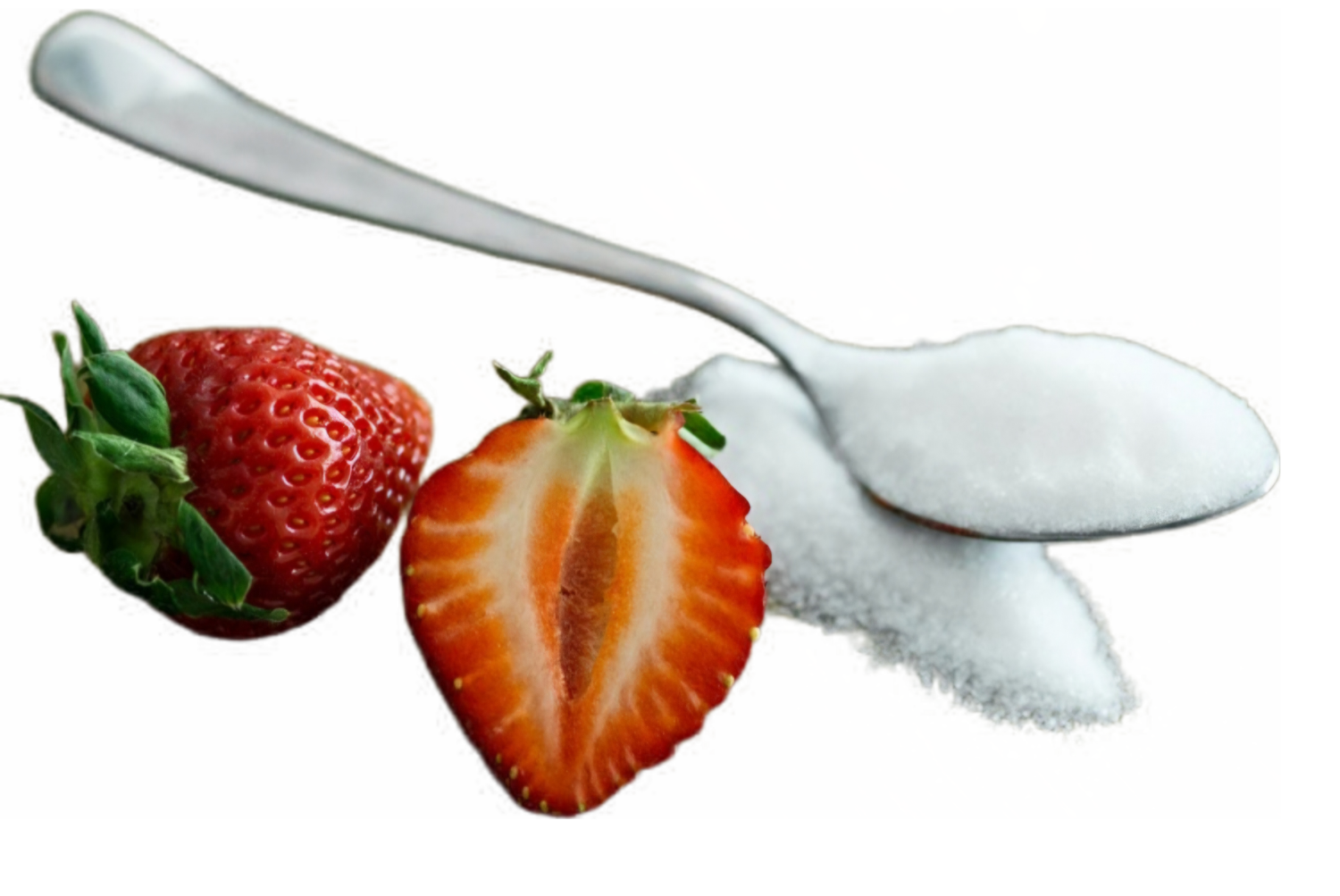
The blood sugar-lowering effect of strawberries
Store AllulosePage audition
It may be surprising, but of all fruits, strawberries contain the most vitamin C : while 150 grams of lemon contains 70 mg, 150 grams of strawberries contain 85 mg of vitamin C!
But now, we're going to talk about another superpower of strawberries, namely their glucose spike-reducing effect.
The blood sugar-lowering effect of strawberries is scientifically supported, partly due to their low glycemic index, high fiber and polyphenol content, and positive physiological effects on insulin sensitivity.
Glycemic profile of strawberries
Strawberries have a low glycemic index (GI), averaging 40, which means they only raise blood sugar levels moderately and slowly.
This is especially important for people with diabetes, prediabetes, and insulin resistance, as it helps avoid sudden spikes in blood sugar and excessive insulin release.
Results of scientific studies
- In a 12-week study, 2 cups of strawberries per day improved insulin sensitivity by 23%, reducing the risk of developing insulin resistance. 1. 2 .
- Another study in obese adults found improved blood sugar profiles and beneficial cardiovascular effects after consuming two and a half cups of strawberries per day. 1.
- Laboratory and animal studies have shown that strawberry extracts measurably reduce blood sugar levels, inhibit the activity of carbohydrate-breaking enzymes (alpha-amylase, alpha-glucosidase), and thereby reduce the rapid absorption of glucose. 1. 2. 3. 4.
Mechanisms of action
- Its antioxidant polyphenols (e.g. ellagitannin, anthocyanins) inhibit the enzymes that break down carbohydrates, leading to slower glucose absorption. 1. 2. 3 .
- The chromium content of strawberries helps insulin function more effectively and increases glucose uptake by cells.
- In animal studies, strawberry juice and extract improved pancreatic β-cell function, increased insulin levels, reduced blood sugar levels, and normalized key enzymes in carbohydrate metabolism. 1. 2 .
Insulin sensitivity and blood circulation
- Strawberries have a positive effect on the functioning of insulin receptors and signaling pathways, so they can help increase glucose uptake by cells – this can result in permanently lower blood sugar levels. 1. 2.
- Its polyphenolic compounds reduce damage to blood vessel walls and microscopic inflammation, which contributes to better metabolism and blood circulation – which can also help the body utilize carbohydrates more efficiently. 1. 2.
Strawberry consumption recommendations for diabetics
Strawberries are a fruit with a moderate carbohydrate content and low energy (~32 kcal/100 g), so 10-20 dkg per day can be regularly included in the diabetic diet, taking into account the daily carbohydrate limit and individual tolerance. 1. 2.
Special observation
According to a Hungarian study, 15 dkg of fresh strawberries, even when combined with granulated sugar, can reduce the blood sugar spike caused by sugar, presumably due to the beneficial physiological effects of polyphenols. 1.

Main mechanisms
- Strawberries are high in soluble and insoluble fiber, which forms a gel-like layer in the digestive tract that physically blocks the absorption of glucose. This fiber slows down the digestion of carbohydrates, allowing the sugar to enter the bloodstream more slowly. 1. 2. 3.
- The polyphenols (anthocyanins, ellagitannins) found in strawberries inhibit the enzymes (alpha-amylase, alpha-glucosidase) that quickly break down carbohydrates into simple sugars, thus slowing down glucose absorption. 1. 2. 3.
- Fiber, through its prebiotic effect, feeds the beneficial bacteria in the gut, which helps balance carbohydrate metabolism and improve insulin sensitivity. 1. 2.
- Eating strawberries before meals measurably reduces the rise in blood sugar levels after carbohydrate-rich meals, as the sugars are absorbed only slowly and gradually. 1. 2.

What happens if we sweeten strawberries with allulose?
When strawberries are sweetened with allulose, the glycemic load of the food remains virtually unchanged, and in fact, allulose can further reduce the rise in blood sugar levels after a meal.
Allulose is a natural sugar substitute with a zero glycemic index that is partially absorbed from the intestine, but does not convert to glucose and does not raise blood sugar levels.
Scientific results
Clinical research has shown that consuming allulose can reduce postprandial blood sugar levels by up to 15–20%, as allulose inhibits the function of glucose transporters in the small intestine and slows down glucose absorption. 1.
The insulin-producing effect of allulose is negligible, but it can indirectly (via gut hormones, e.g. GLP-1, GIP) further increase insulin sensitivity, promoting stable blood sugar levels. 1. 2.
The beneficial glycemic effects of strawberries (e.g. enzyme inhibition by polyphenols, fiber content) and the combined use of allulose may result in a mutually reinforcing , synergistic effect, as both slow down sugar absorption and reduce the rapid rise in blood sugar levels. 1.
Practical significance
Strawberries sweetened with allulose are an ideal choice for diabetics, insulin-resistant people, or those who consciously monitor their blood sugar levels, as not only do the beneficial effects of strawberries remain, but the other sweetener will not cause unnecessary blood sugar fluctuations.

Cottage cheese dumplings recipe with allulose and strawberries
Summary
Regular, reasonable consumption of strawberries has been shown to help maintain normal blood sugar levels, slow glucose absorption, and help improve insulin sensitivity. These effects are particularly useful in supporting the treatment of type 2 diabetes, insulin resistance, or prediabetes.
The blood sugar-lowering effect of strawberries is therefore mainly based on phytonutrients, fiber, and antioxidants: these slow the absorption of carbohydrates and sugars, reduce inflammation, improve insulin sensitivity, and contribute to maintaining normal carbohydrate metabolism.
Strawberries slow down the intestinal absorption of glucose, mainly due to their fiber and polyphenol content, making blood sugar fluctuations more avoidable and contributing to long-term blood sugar stability.
Sweetened with allulose , strawberries have an even more beneficial effect on blood sugar levels, not raising them and even potentially further reducing postprandial glucose and insulin responses .

